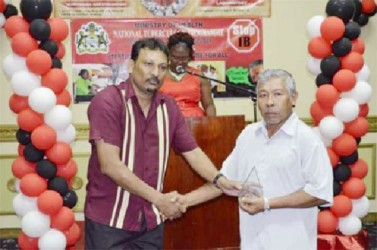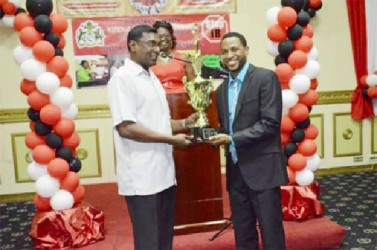The National Tuberculosis programme culminated a week-long celebration for World Tuberculosis (TB) day with a staff appreciation ceremony on Friday evening at the Pegasus Hotel.
The event highlighted the work done by several health personnel and partners over the years in expanding the DOTS (Directly Observed Treatment Short Course) programme throughout the regions and in decentralising TB services.
A release from the Government Information Agency (GINA) said that five plaques were awarded for best practices. The Mazaruni Prison won for most improved prison in TB control, most outstanding volunteer in the fight against TB went to Lloyd Henrietto, the Red Cross received the award for most outstanding contribution in

TB community service in the hinterland regions, Food for the Poor received an award for its work in fostering partnership and reaching the less fortunate TB patients and National AIDS Programme Secretariat (NAPS) for its partnership in the fight against TB/HIV.
There were also 10 awards for the individual outstanding performance in TB service in each region and the distribution of 20 certificates of appreciation for service and support in the fight against TB.
The Dr Motilall Award for TB/HIV service went to Dr Roscoe McDonald. The award is named after the late doctor who headed the fight against TB for many years and is given for dedication and commitment in the fight against TB at the regional level.
GINA said that in the past the Georgetown Chest Clinic was seen as the only institution which carried the fight against TB and it comprised only few staff headed by the late Dr Motilall and had support from an NGO, the Guyana Chest Society.
It was only in 1994, that after the National TB programme was boosted with additional staff, Dr Shamdeo Persaud took up the mandate with the support from Canadian Society for International Health with funding from CIDA to start the implementation of DOTS in Guyana. The successful implementation of the DOTS System in all but two regions (Regions 8 and 9), has been essential to ensuring case detection, standardised treatment, with supervision and patient support.
“In order for us to find the TB patients we need the services and to treat them effectively, so that they can become cured, we need the service of laboratory personnel, the nurses, the DOTS workers, the community volunteers in the case of the hinterland areas along with the necessary resources,” Manager, National Tuberculosis Programme, Dr Jeetendra Mohanlall said.

According to Dr Mohanlall, TB is the cause of death of about 1.7 million people each year worldwide. Nonetheless, Guyana is already showing a good trajectory of declining TB incidence. In 2013, alone there was a reduction in the number of cases; from 92 per a 100,000 population, in 2012 to 78 per 100,000 populations in 2013.
“Once we keep on this track, our goal is to further drop the incident to 60 per 100,000 in 2015. As we transfer this fight to eliminate it is crucial that everyone joins the fight in order to stop TB in our country,” he said.
Chief Medical Officer (CMO) Shamdeo Persaud urged the staff to keep pressing on with the fight against the disease. “We are not out of the woods yet and every time the ugly head of multi-drug resistant TB rears among us, every time an adult male or female loses a lung or part of a lung, every time TB spreads beyond the lung to maybe one of the other organs, we are struck with that reality that TB is still a force to be reckoned with, and in no way we can say that we have won this fight, even though we have done well. We have won lots of battles along the way, but the war still goes on and we need to move forward,” he said.





